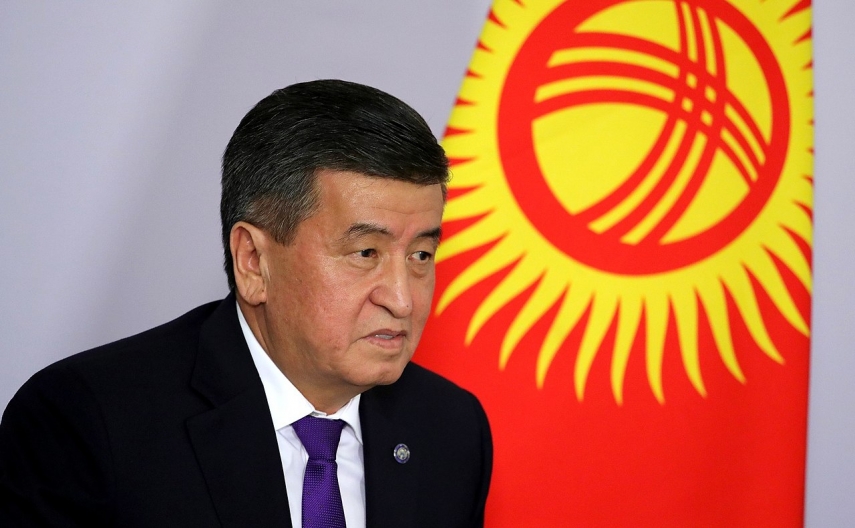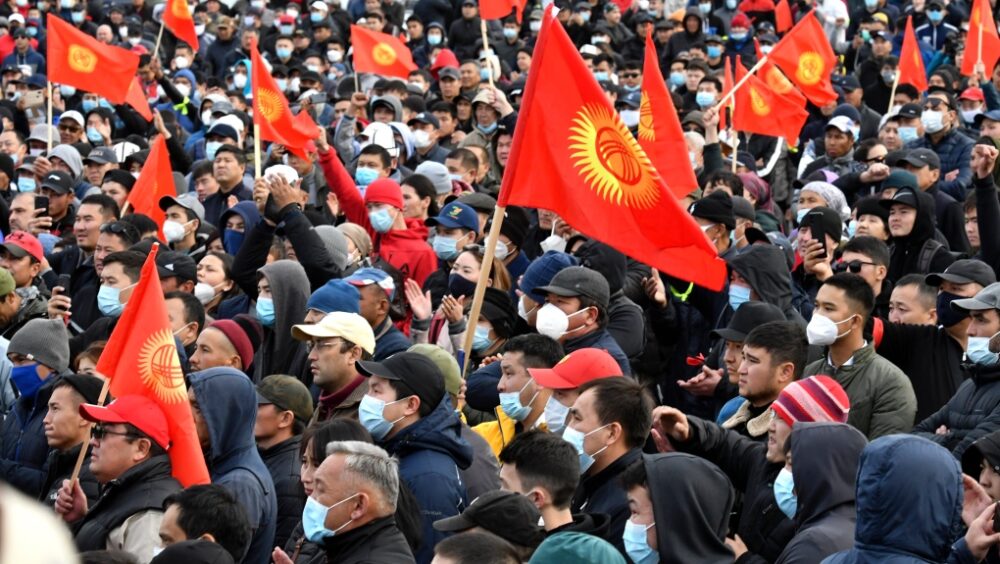BY: Danieal Ranjbar

PEJOURNAL – Protests in Kyrgyzstan began on October 5, 2020, in response to rigged parliamentary elections. Thousands of protesters have taken to the streets since then. Kyrgyz President Sorenbay Zhinbekov said that some political forces had tried to seize power illegally overnight and called on political party leaders to calm down their supporters.
“I urge my compatriots to remain calm and not give in to enemy provocations,” he said of the widespread protests in Bishkek, the capital of Kyrgyzstan. Jinbekov added that he had instructed security forces not to shoot at protesters. The statement came after Jinbekov’s spokeswoman, Tolguna Stamaliyeva, said the president had said that the results of the October 4 parliamentary elections could be annulled.
“Currently, the situation is under control and he expressed confidence that all political forces will put the interests of the country above their own interests and will not allow a rift in society and any factor that worries the citizens of the country,” he added.
Protesters release former senior Kyrgyz officials following protests in Bishkek in an area of the White House where the Kyrgyz parliament and presidential government are located. Protesters try to enter government headquarters during a rally against the October 5, 2020 parliamentary elections in Bishkek, Kyrgyzstan. They also released former President Almazbek Atambayev and former Prime Minister Jantoro Satybaldiyev, as well as former President Farid Niyaz. Atambayev had previously been sentenced to 11 years in prison on corruption charges.

How the Protests Began?
Widespread protests erupted after Kyrgyzstan’s vote in Sunday’s general election, with preliminary results showing that only four parties, including two pro-government parties – Kyrgyzstan’s Birimdik and Makimim – and two centrist parties – Kyrgyzstan and Buton – won seats in parliament. Kyrgyzstan has received enough votes.
As many as 2,000 supporters of those parties failed to win 7% of the vote to win seats in parliament. Demonstrators gathered in Alato Square in Bishkek on Monday morning , Day after Election, to demand a review of the election results. They accused the government of rigging the election results and buying votes.
Protesters seize the president’s residence, and widespread protests continue in Bishkek over the October 4 parliamentary election results. Protesters seized the president’s residence and the National Security Committee building.
It is said that police used rubber bullets, tear gas and sound grenades to disperse protesters who threw stones at the officers, and the use Protesters burned a patrol car and an ambulance damaged six. At least one person was killed and 590 others, including about 40 police officers, were injured in the clashes.
Results
Meanwhile, the Shanghai Cooperation Organization (SCO) has described Sunday’s election as free and legal, as does the Organization for Security and Co-operation in Europe (OSCE), which praises the work of the Central Election Commission of Kyrgyzstan (CEC). The Central Election Commission of Kyrgyzstan, for its part, has pledged to investigate complaints of alleged irregularities at 31 polling stations during the voting.
Earlier in the day, Kyrgyz opposition leaders called on parliament to convene to determine the new cabinet. Kyrgyz Central Commission annuls results of Sunday’s parliamentary elections. “The Central Election Commission (CEC) decided to annul the election results with 12 votes in favor,” Golnara Jurabayeva wrote on Facebook.
Kyrgyzstan’s parliamentary elections were held on October 4th. Turnout was 56.5 percent. After processing the votes in 98% of the polling stations, the preliminary results showed that four parties have entered the parliament:
- Birimdik (Vahdat, pro-government party) with 52% of the vote
- Kyrgyzstan (Native Kyrgyzstan, pro-government party) with 23.89%
- Kyrgyzstan (Moderate Party) with 8.73%
- Button Kyrgyzstan (United Kyrgyzstan, Moderate Party) with 11.7%
Latest News
An extraordinary session of the parliament will take place on October 16 in Bishkek at the state residence “Ala-Archa”. One issue on the agenda is the resignation of President Sooronbai Jeenbekov. This was reported by the press service of the Jogorku Kenesh (parliament). On the eve, Jeenbekov announced his resignation as president and explained his decision with a desire to prevent bloodshed. Power passed into the hands of Prime Minister Sadyr Japarov, appointed on the third attempt. There is a version that Jeenbekov’s dismissal happened with the tacit consent of the Kremlin, with which the ex-president did not develop relations.
Jeenbekov announced his resignation amid incessant mass protests :
“The aggression does not subside, the demand for my immediate resignation continues. The current situation is close to a bilateral conflict. On the one hand, the protesters, on the other, the law enforcement agencies. Military personnel and law enforcement agencies are required to use weapons to protect the state residence. In this case, blood will be shed, it is inevitable. I urge both sides not to succumb to provocations.” Jeenbekov called on new Prime Minister Sadyr Japarov and other politicians to get their supporters off the streets and “bring back a peaceful life.”
In other side accordance with the law, in the event of the resignation of the president, his powers are automatically transferred to the speaker of parliament. Kanat Isayev and that President had no moral right to occupy this position, since the term of office of the parliament of the sixth convocation was expiring.
Former Prime Minister and leader of the Ar-Namys party, Felix Kulov, said that some forces (sooner or later, I am sure, it will become known what forces are) decided to go for a forceful seizure of power and the president was faced with a choice: voluntary resignation or war – real, without any quotes.
Background to the Kyrgyzstan Protests
Kyrgyzstan faced two revolutions in the early 21st century, including the Tulip Revolution of 2005 and the Kyrgyz Revolution of 2010. In August 2020, Kyrgyz President Sorenbay Zhinbekov said parliamentary elections would not be postponed despite the outbreak of the Coronavirus.During the election, several parties were accused of buying votes. Several journalists also reported being harassed and attacked by the parties that entered parliament, only one, the United Kyrgyzstan, which opposes the current government led by Jinbekov, entered parliament.
Political analysts have linked the 2020 protests to the socio-economic divide between the southern part of the country, where the farming community lives, and the more developed north. According to preliminary results, 100 of the 120 seats were filled by southerners who supported Jinbekov. During Jinbekov’s presidency, Kyrgyzstan joined the Russian-led Eurasian Economic Union and closed the American transport hub in Manas, which was used for the war in Afghanistan.
Interesting Analysis
In an interview with Azattyk, Felix Kulov said that the idea of the president’s resignation has far-reaching goals. “First, Sadyr Zhaparov is proposed for the post of prime minister, and parliament is practically assembled by force. After the election, the question of the resignation of the president is raised, and now the dissolution of parliament. Now they will begin to disperse the Jogorku Kenesh, remove the speaker by force, so that power does not pass to him. And then power passes into the hands of one person – the Prime Minister. The question will arise for the people and for Sadyr Japarov himself – why does he need this Power?
3 Years ago World Bank Master, Hans Timer, in one of his statement speak about what type of future can be happen in Central Asia that actually now we can see somehow he was right; “Stressing the need for sweeping reforms in Central Asian countries, the World Bank chief warned that tensions in Central Asia would be inevitable if they did not adjust their economies to low oil prices on world markets.”
Referring to the huge energy reserves in Central Asian countries, he added: “These countries must take many measures to adapt their economies to low oil prices in world markets, such as extensive reforms to be competitive if the governments of the region take action.” Failure to do so will seriously damage the power of the ruling elite and could pose serious political risks.
Although there is no reform in Central Asia, similar events in the Arab world could occur in the region. Although Kazakhstan, Turkmenistan and Uzbekistan are the main exporters of energy reserves in Central Asia, two other countries in the region, including Tajikistan and Kyrgyzstan, also earn their main income from the sale of raw materials and the employment of hundreds of thousands of citizens in Russia.
Following the decline in oil prices in world markets, the foreign exchange earnings of Central Asian countries also decreased significantly, and this has led to a significant reduction in economic growth in these countries. In such circumstances, change the balance in the economy in order to adapt to reality. The new economy Lower oil prices, which have been going on since 2014, should be a major task for Central Asian countries.
Political analyst Arkady Dubnov told NG that the process of preparation for the parliamentary and presidential elections is ahead. It is obvious that the main beneficiary of the latest resignations and appointments was the Prime Minister Sadyr Japarov, who was appointed for the third time. It seems that he sees himself as the future president of Kyrgyzstan.
Alexander Knyazev, expert on Central Asia and the Middle East:
“One can expect that the competition for power will only intensify, because in this situation the role of criminals has sharply increased. It cannot be ruled out that the political process will turn into a kind of military space, when rival groups will wage war among themselves. 15 years ago I launched the concept of “Afghanization of Kyrgyzstan” into circulation. Now I think that we can speak not only about Afghanization, but also about somalization, when any right can be achieved simply by force of arms.”
Conclusion
On the eve of Jeenbekov’s resignation, it became known that Moscow had suspended financial support to Bishkek until political stabilization in Kyrgyzstan. Russian President’s press secretary Dmitry Peskov said: “There is no government as such, and we see a crisis moment in the republic, therefore, of course, before all departments, all organizations start working, a certain pause makes sense.” He added that the Russian authorities consider all actions aimed at stabilizing the situation in this country important. Peskov stressed that contacts with Bishkek will continue, as it is “a very close partner of Russia.”
We will remember, the Kremlin “tried to feel the ground under its feet” and establish contacts on October 9, Peskov reported. On the instructions of Russian President Vladimir Putin, Deputy Head of the Presidential Administration Dmitry Kozak went to Bishkek. He met with Sooronbai Jeenbekov and Sapar Zhaparov. According to some Kyrgyz politicians, “the Russian side expressed concern and offered its assistance in resolving the situation from the moment the situation arose.”
Moreover, Jeenbekov met with Putin on September 30 and warned him about the activation of certain forces that threaten the stability of Kyrgyzstan and “drive a wedge into allied relations” with Russia. Kyrgyz experts believe that some kind of forces meant Kyrgyz organized crime groups (organized crime groups), which are striving for power. By the way, the ex-head of the Security Council Omurbek Suvanaliev spoke about this the other day: criminals prevailed over politicians. According to him, many politicians are intimidated by groups, organized crime is coming to power.
In Bishkek, it is believed that Russian intervention prevented a new revolution and a rift between north and south. The formation of the government, headed by Sadir Japarov as prime minister, was also made possible through the mediation of Moscow representatives.
Sources
- Victoria Panfilova
Observer of the Politics Department of Near Abroad Countries, Nezavisimaya Gazeta